BXT7059
BXT7059 Single Board Computer
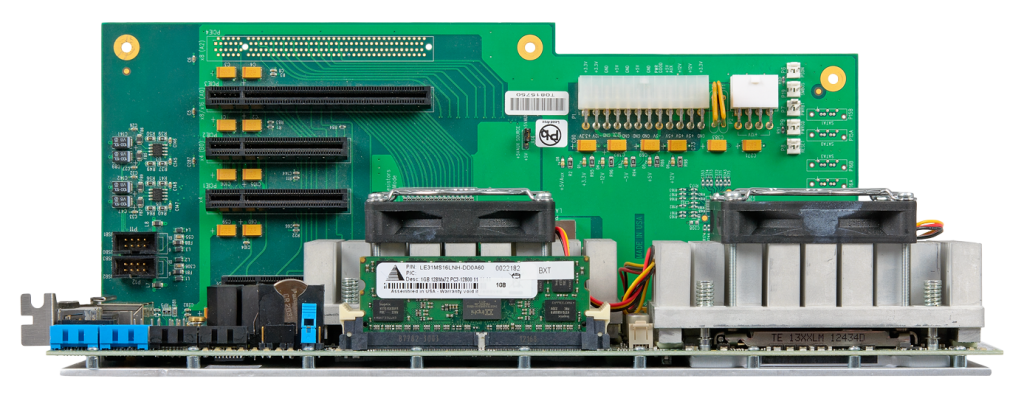
Key Features
- Dual 10, 8, & 6-Core Processors
- DDR3-1600 Memory Interfaces
- Native PCI Express 3.0 Links
- Rugged SBC Design
more images:
The BXT7059 Single Board Computer
The BXT7059 single board computer is a dual-processor PICMG 1.3 SBC featuring the Intel® Xeon® E5-2400 v2 series processors and native support for PCI Express 3.0 I/O cards. The 22nm Intel® Micro-Architecture design of the Intel® Xeon® E5-2400 v2 series processors saves power while providing a performance boost over the previous generation Intel® Xeon® E5-2400 series processors built on a 32nm micro-architecture. This BXT7059 single board computer supports DDR3-1600 Mini-DIMMs with a maximum system memory capacity of up to 48GB and features SAS and SATA/600 ports, multiple I/O and communication interfaces including PCI Express 3.0.
The SBC’s flexible I/O system design is driven by the PCIe 3.0 processor links and the Intel® C604 Platform Controller Hub (PCH). The external I/O card interfaces adapt to PCIe 3.0, PCIe 2.1/2.0 and PCIe 1.1 plug-in cards with either a x16, x8, x4 or x1 PCI Express edge connector. An additional PCI Express 3.0 x16 link expansion is available using the optional PEX10 module on the BXT7059 SBC.
The six-channel, DDR3-1600 memory interfaces feature the latest DDR3 Mini-DIMM technology, while the SBC’s three Gigabit Ethernet LAN interfaces and the choice of an alternate backplane LAN or cable LAN interface ease many system communication challenges. The backer plate design enhances overall system stability while providing additional component protection.
Key features of the BXT7059 single board computer include:
- Flexible I/O system design using the Intel® C604 Platform Controller Hub (PCH)
- Six-channel, DDR3-1600 memory interfaces feature the latest DDR3 Mini-DIMM technology
- PCI Express 3.0 / 2.0 / 1.1 interfaces support x16, x8, x4 and x1 PCI Express cards
- Three Gigabit Ethernet LAN interfaces plus alternate backplane LAN or cable LAN interface
- PEX10 option provides an additional x16 PCIe Gen3 interface for backplane link expansion
- Enhanced SBC stability and component protection provided by unique backer plate design
- Processor options available with up to ten execution cores and twenty threads
BIOS flexibility is built in by offering various system BIOS modifications that may be needed to meet unique platform requirements and maintains strict revision control for all custom BIOS variations.
Tech Specs
Model Number
BXT7059
Form Factor
PICMG® 1.3 Form Factor Automatically adapts to graphics or server-class backplane PCIe link configurations
one x16 and one x4/four x1 or two x8 and one x4/four x1 or four x4 and one x4/four x1 PCIe links
CPU
2 – Intel Xeon E5-2400 v2 Series
-OR-
2 – Intel Xeon E5-2400 Series
Processors
Embedded (long-life) Processors (22nm Intel® Micro-Architecture)
- Two, Ten-Core Intel® Xeon® Processors E5-2448L v2 (Low voltage, 1.8GHz (2.4GHz*), 25B Cache, DDR3-1600 max memory speed)
- Two, Eight-Core Intel® Xeon® Processors E5-2428L v2 (Low voltage, 1.8GHz (2.3GHz*), 20MB Cache, DDR3-1600 max memory speed)
- Two, Six-Core Intel® Xeon® Processors E5-2418L v2 (Low voltage, 2.0GHz, 15MB Cache, DDR3-1333 max memory speed)
- Two, Eight-Core Intel® Xeon® Processors E5-2450 v2 (Std. voltage, 2.5GHz (3.3GHz*), 20MB Cache, DDR3-1600 max memory speed
- Two, Six-Core Intel® Xeon® Processors E5-2430 v2 (Std. voltage,2.5GHz (3.0GHz*), 15MB Cache, DDR3-1600 max memory speed)
(x.xGHz*) = Max core frequency available via Intel® Turbo Boost Technology
Embedded (long-life) Processors (32nm Intel® Micro-Architecture)
- Two, Eight-Core Intel® Xeon® Processors E5-2448L (1.8GHz, 20MB Cache, DDR3-1600 max memory speed)
- Two, Six-Core Intel® Xeon® Processors E5-2428L (1.8GHz, 15MB Cache, DDR3-1333 max memory speed)
- Two, Four-Core Intel® Xeon® Processors E5-2418L (2.0GHz, 10MB Cache, DDR3-1333 max memory speed)
- Two, Six-Core Intel® Xeon® Processors E5-2430 (2.2GHz, 15MB Cache, DDR3-1333 max memory speed)
All the 32nm Intel Micro-Architecture processors (formally known as Sandy Bridge-EN) listed here support Intel® VT, Intel® TXT, and Intel® Hyper-Threading.
BIOS (Flash)
AMI – Aptio® 4.x
Chipset
Intel® C604 Platform Controller Hub (PCH)
Configuration
DDR3-1600 (max) / 48GB (max.)
Comms
1 – x16 -or- two x8 -or- four x4 and one x4 -or- four x1 PCIe links (PCIe 3.0/2.0/1.1) (Edge connectors A&B)
2 – 10/100/1000Base-T (I/O Bracket)
1 – 10/100/1000 (Edge conn. C)
I/O
2 – SATA/600 & 4 – SAS/SATA/300 ports with RAID
1 – SATA/300 backplane interface (Edge connector C)
8 – USB interfaces
1 – IOB33
1 – PEX10
Memory
48GB system memory is supported when populating the board’s six-channel DDR3 (DDR3-1600) interface, and the associated six Mini-DIMM sockets (3 per CPU) with 8GB Mini-DIMMs.
The maximum memory interface speed supported is governed by several application considerations including which Intel® Xeon® E5-2400 v2 or Intel® Xeon® E5-2400 Series processors are used on the BXT7059. The chart below shows the max memory interface speed possible with each BXT7059 processor option.
| Max. DDR3 Speed | Processor | Base Core Speed | Cores / Threads | Cache | Long-life Status | Max TDP |
|---|---|---|---|---|---|---|
| DDR3-1600 (PC3-12800) | Intel® Xeon® E5-2450 v2 | 2.5GHz | 8/16 | 20MB | Yes | 95W |
| DDR3-1600 (PC3-12800) | Intel® Xeon® E5-2430 v2 | 2.5GHz | 6/12 | 15MB | Yes | 80W |
| DDR3-1600 (PC3-12800) | Intel® Xeon® E5-2448L v2 | 1.8GHz | 10/20 | 25MB | Yes | 70W |
| DDR3-1600 (PC3-12800) | Intel® Xeon® E5-2428L v2 | 1.8GHz | 8/16 | 20MB | Yes | 60W |
| DDR3-1600 (PC3-12800) | Intel® Xeon® E5-2448L | 1.8GHz | 8/16 | 20MB | Yes | 70W |
| DDR3-1333 (PC3-10600) | Intel® Xeon® E5-2430 | 2.2GHz | 6/12 | 15MB | Yes | 95W |
| DDR3-1333 (PC3-10600) | Intel® Xeon® E5-2428L | 1.8GHz | 6/12 | 15MB | Yes | 60W |
| DDR3-1333 (PC3-10600) | Intel® Xeon® E5-2418L v2 | 2.0GHz | 6/12 | 15MB | Yes | 50W |
| DDR3-1333 (PC3-10600) | Intel® Xeon® E5-2418L | 2.0GHz | 4/8 | 10MB | Yes | 50W |
PCI Express Edge Card Interfaces
Standard PICMG 1.3 PCI Express Interfaces – Automatically adapts to graphics or server-class backplane PCIe link configurations. The direct PCIe links from the board’s processors (links A0, A1, A2, A3, IOB33 and PEX10) may operate as PCIe Gen 1.1, PCIe Gen 2.0 or PCIe Gen 3.0 depending on the backplane design. The x4 link from the board’s PCH (link B0) is always a PCIe 2.0 or 1.1 link regardless of what is connected to this link and the option card that is used. PCIe link (B0) from the board’s PCH has a x4 default configuration and may automatically bifurcate into four, x1 PCIe links depending on the target device. The optional x4 link available with a Trenton IOB33 expansion module is a PCIe 2.0/1.1 link. The IOB33 expansion link may operate as 4 – x1 links form the BXT7059 with a SPI updated to the board. Contact Trenton is you are interested in this SPI update.
Optional PCI Express PEX10 Link Expansion – Installing a Trenton PEX10; PCI Express Expansion module, on the back of the BXT7059 provides four additional x4 PCIe Gen 3 links to a backplane that is equipped with a mating PEX10 interface connector and plumbed for PCIe 3.0. The backplane may use these additional x4 links independently or as one additional x16 PCIe or two x8 PCI Express links. The links from the PEX10 connector my operate as PCIe 1.1, 2.0 or 3.0 links depending on the backplane construction and end point devices connected to the interface.
A Word About PCI Express 3.0 Interfaces – PCIe 3.0 doubles the PCIe 2.0 per lane interface speed from 500MB/s (5GT/s) to 1GB/s (8 GT/s) via speed changes and protocol enhancements. As with all previous versions of the PCI Express specification, the PCIe 3.0 interface is backwards compatible and will run Gen 3, Gen 2 and Gen 1.1 I/O cards on the same interface link. Running a PCIe 3.0 target device such as a Gen 3 I/O card at the actual PCIe 3.0 interface speed of 1GB/s requires that the PCIe 3.0 link from the root complex (i.e. the processor on the BXT7059) to the target card be tuned and optimized to meet the speed requirements of PCI Express 3.0. If these tuning conditions are slightly off and not fully optimized, then the interface will operate at a slower interface speed. Contact Trenton for more details regarding the specific of your particular PCIe 3.0 implementation.
Video Interface
XGI® Volari™ Z11M Graphics Processing Unit, 8MB video memory supports screen resolutions up to 1920 x 1200 (WUXGA) with a 64K color depth
Ethernet Interfaces
Intel® NHI350-AM2 Ethernet Controller – Two 10/100/1000Base-T on I/O Bracket Connectors
Intel® 82579 Ethernet PHY – One 10/100/1000Base-T interface routed to SHB edge connector C*
*BP LAN Cable Option via P22 – You can build your own alternate backplane LAN cable using the instructions in the Jumpers, Connectors and Memory document for the BXT7059 or you can take advantage on this third LAN interface by using the pre-made alternate backplane LAN cable with Trenton part number: 193500001150-00.
On-Board Interfaces
Eight USB 2.0 ports – Two each on the I/O bracket and on-board headers plus four routed to SHB edge connector “C”
Two SATA III/600 interfaces with RAID 0,1,5 and 10 support
Four SAS / SATA II/300 interfaces with RAID 0,1,5 and 10 support
Optional IOB33 provides the following I/O expansion capabilities:
– IOB33 I/O plate connectors
– Two DB9 RS232 serial ports and one PS/2 MiniDin for PS/2 mouse & keyboard
– IOB33 header connectors
– Floppy drive, parallel port, PS/2 keyboard and PS/2 mouse
Watchdog Timer
The BXT7059 provides a watchdog timer with seven programmable timeout periods of 32 msec, 128 msec, 512 msec, 1 second, 4 seconds, 8 seconds or 32 seconds via board component U4. When enabled the WDT generates a system reset. WDT control is supplied via the General Purpose IO pins from the Intel® C604 Platform Controller Hub (PCH).
See the watchdog timer section in the specifications chapter of the BXT7059 Hardware Manual for more detailed information and a WDT programming example.
Battery
Lithium – CMOS data retention
Mechanical
Board dimensions – 13.330” (33.86cm) L x 4.976” (12.64”cm) H
Standard cooling solution height – 2.15” (54.61mm)
Acency Approvals and Compliance
Designed for UL69050, CAN/CSA C22.2 No.60950-00, EN55022:1998 Class B, EN61000-4-2:1995, EN61000-4-3:1997, EN61000-4-4:1995, EN61000-4-5:1995, EN61000-4-6:1996, EN61000-4-11:1994
Mean Time Between Failures (MTBF)
MTBF – 164,861 Power-On Hours (POH) at 40° C per Bellcore
Power Requirements – 100% stressed
Typical Values* – 100% Stressed with 24GB of system memory
| CPU | Intel® No. | +5V | +12V | +3.3V |
|---|---|---|---|---|
| 2.5GHz | E5-2450 v2 | 1.93A | 19.57A | 3.55A |
| 2.5GHz | E5-2430 v2 | 1.72A | 12.32A | 3.21A |
| 1.8GHz | E5-2448L v2 | 1.68A | 12.60A | 3.11A |
| 1.8GHz | E5-2428L v2 | 1.72A | 10.07A | 3.23A |
| 2.0GHz | E5-2418L V2 | 1.62A | 8.31A | 3.19A |
| 2.2GHz | E5-2430 | 1.34A | 15.11A | 4.55A |
| 1.8GHz | E5-2448L | 1.37A | 11.60A | 4.49A |
| 1.8GHz | E5-2428L | 1.34A | 10.27A | 4.55A |
Eight-core CPUs – E5-2450 v2, E5-2428L v2 and E5-2448L
Six-core CPUs – E5-2430 v2, E5-2418L v2, E5-2430 and E5-2428L
* These are typical power numbers; actual power numbers will vary as a function of the specific BXT7059 system configuration design.
Power Requirements – Idle
Typical Values* – Static Desktop (System Idle) with 24GB of system memory
| CPU | Intel® No. | +5V | +12V | +3.3V |
|---|---|---|---|---|
| 2.5GHz | E5-2450 v2 | 1.65A | 6.66A | 3.11A |
| 2.5GHz | E5-2430 v2 | 1.56A | 5.22A | 3.21A |
| 1.8GHz | E5-2448L v2 | 1.66A | 5.58A | 3.03A |
| 1.8GHz | E5-2428L v2 | 1.58A | 4.96A | 3.05A |
| 2.0GHz | E5-2418L V2 | 1.48A | 4.13A | 2.98A |
| 2.2GHz | E5-2430 | 1.30A | 3.73A | 4.15A |
| 1.8GHz | E5-2448L | 1.34A | 4.06A | 4.11A |
| 1.8GHz | E5-2428L | 1.30A | 3.89A | 4.18A |
Ten-core CPUs – E5-2448L v2
Eight-core CPUs – E5-2450 v2, E5-2428L v2 and E5-2448L
Six-core CPUs – E5-2430 v2, E5-2418L v2, E5-2430 and E5-2428L
* These are typical power numbers; actual power numbers will vary as a function of the specific BXT7059 system configuration design.
Operating Temperature
Operating Temperature: 0-50° C. with standard cooling solution and 350LFM of continuous airflow
Environmental
Airflow 350LFM continuous airflow
Storage -20° to 70° C.
Humidity 5% to 90% non-condensing
Operating Systems
The BXT7059 has been tested using a number of popular and readily available operating systems including: Microsoft Windows XP X64, Windows Server 2003, Windows Server 2008 R2, Windows 7 and a number of variations of Linux including Red Hat. This testing process confirms the BXT7059’s PCI Express interface and device I/O functionality. We do not recommend using the Microsoft Windows XP32 SP2 or SP3 operating system due to limited functionality concerns. Contact us for additional information.
Downloads
BXT7059 Datasheet – Sandy Bridge-EN
BXT7059 Technical Information – Trenton PICMG 1.3 Compatible Backplanes
BXT7059 22nm Intel® Micro-Architecture vs. 32nm Intel® Micro-Architecture Benchmark Results
Hardware Manual for BXT7059 & BXTS7059, Intel® Xeon® E5-2400 v2 and Intel® Xeon® E5-2400 Series Processors
Rev C. – BIOS Setup Manual for BXT7059 & BXTS7059 System Host Boards with Intel® Xeon® E5-2400 v2 or Intel® Xeon® E5-2400 Series Processors
Rev A. – BIOS Setup Manual for BXT7059 & BXTS7059 System Host Boards with Intel® Xeon® E5-2400 Series Processors
Intel® PRO/1000 MT Network & Server Adapters for the Intel® NHI350-AM2 Ethernet Controller (Dual GB LAN)
Intel® PRO/1000 MT Network & Server Adapters for the Intel® 82579 Ethernet PHY (Backplane LAN)
Intel® AMT/ME Driver Ver. 11 for Intel® 604 PCH
Intel® SAS/SATA Raid Drivers for the Intel® C604 PCH used with Sandy Bridge CPUs
Intel® SAS/SATA Raid Drivers for the Intel® C604 PCH used with Ivy Bridge CPUs
Video Driver for the XGI® Volari™ Embedded Z11 Graphics Processing Unit
Intel Driver Download Center
Options
Single Board Computers

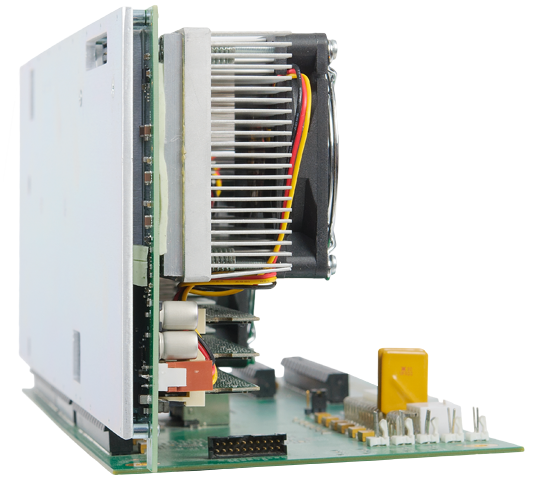
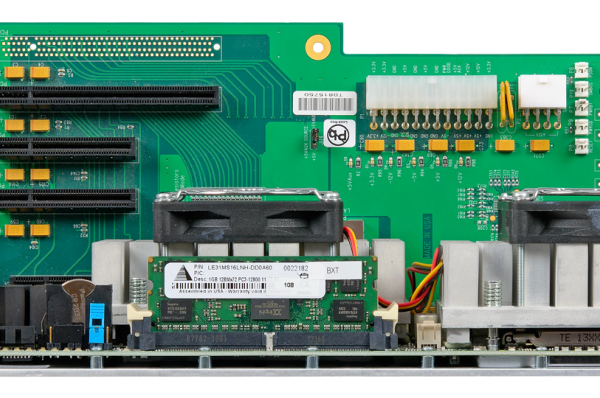
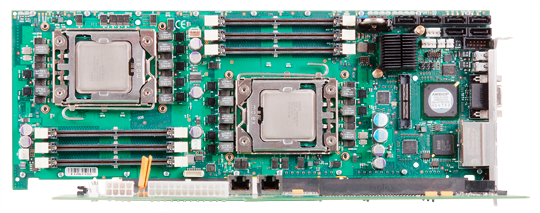
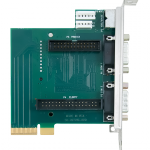 IOB33 PCIe and IO Expansion Board
IOB33 PCIe and IO Expansion Board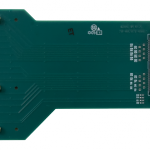 PEX10 PCI Express Expansion Module
PEX10 PCI Express Expansion Module